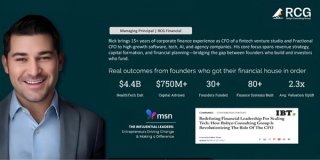Financial language and the evolution of speech recognition technology
Published by Jessica Weisman-Pitts
Posted on September 1, 2022
5 min readLast updated: February 4, 2026

Published by Jessica Weisman-Pitts
Posted on September 1, 2022
5 min readLast updated: February 4, 2026

By Katy Wigdahl, CEO, Speechmatics
Due to its long heritage and diverse spread of legacy technologies, it can be challenging to integrate new technological developments into the financial industry. But by not doing so, many financial service providers can be left behind as more agile, digital-native challengers deliver on increasingly sophisticated customer demands, by automating workflows and ultimately reducing costs.
One such technology has been employed by businesses in other industries to increase efficiency and improve the customer experience for some time now. Recent advances in automatic speech recognition (ASR) mean the financial services industry can now enjoy similar benefits across a range of applications. Indeed, aside from obvious business benefits, accurate speech recognition makes businesses more inclusive – by understanding every voice, the finance industry as a whole can do better by all of society.
Specific vocabulary
ASR was once the stuff of science fiction. Now though, many of us use it in our daily lives – asking questions of Siri or Alexa, for instance, or dealing with automated customer service assistants when calling our energy supplier.
The beauty of ASR is that it can be trained. It can add commonly used words or new slang and jargon to its vocabulary, expanding its comprehension of speech. Some, more sophisticated forms of ASR software, like Autonomous Speech Recognition, are even programmed to train themselves – they are continuously evolving with the world, capable of learning, adopting, and retaining new words.
Historically, though, training data had to be manually tagged, classified, or ‘labelled’. As a result, speech recognition engines were trained on narrow datasets, which failed to represent the diversity of voices that use them and lacked the breadth of vocabulary used in other sociodemographics. But, by training these engines through exposure to thousands of voices, using millions of hours of unlabelled, more representative data, there has been a paradigm shift in accuracy – particularly when it comes to complex industry-specific terms and jargon.
Indeed, the financial services industry is notoriously jargon-heavy, using complex terms that are either completely unique to the sector or that can be confused with commonly used phrases. Acronyms such as VAT and SEC can often confuse standard speech-to-text engines, while abbreviations like GAAP (Generally Accepted Accounting Principles) can be mistaken for other words, like ‘gap’ in this case.
An appreciation of this issue has led to the development of domain-specific technology, meaning ASR solutions are now able to capture speech data within the financial services industry as intended, turning unstructured, audio data into accurate and – importantly – immediately usable transcriptions.
Multiple use cases
Capable of identifying financial terminology in verbal conversations, this latest iteration in the evolution of ASR technology can be employed in a number of use cases, such as ensuring compliance and fraud identification. In fact, financial services organisations are already using it to transcribe earnings calls, for example, as well as to aid call centre analysts and traders.
Other use cases in which ASR can offer benefits for the financial services industry include improving the efficiency of contact centres. Analysing speech data can help contact centres unlock new meaning and value from customer interactions. In the past, only around three percent of call data was ever evaluated. ASR technology, though, makes it easy to archive and evaluate every single customer interaction, the advantages of which are self-evident. Among the top business efficiencies unlocked by employing speech recognition, recent research found that 40 percent of contact centres were able to boost productivity by anticipating the purpose of each call, enabling agents to handle more interactions within a similar period of time.
The proliferation of voice assistants can’t be ignored either. A study by Juniper Research reveals that the value of e-commerce transactions performed via Amazon Echo, Siri, Google Assistant and Cortana is set to increase by 400 percent between 2021 and 2023. And when more than two thirds of the global population have access to a mobile device, there’s absolutely no reason for the financial services industry not to be prepared for voice-powered transactions and interactions.
And, of course, regulatory compliance is, and always will be, a top priority for financial services organisations. FCA COBS 11.8, for example, explicitly requires banks to have a system in place to record interactions across the business in order to ensure they’re transparent should a compliance-related issue arise. Accurate and effective ASR recognition technology helps organisations monitor and automatically transcribe interactions at scale, reducing costs and protecting them from both reputational damage and regulatory fines.
Growing opportunity
As businesses and consumers everywhere enjoy the benefits of ever more sophisticated speech recognition technology, the global speech-to-text market is expected to rise by a 19 percent CAGR to reach $5.8 billion by 2027.
But until recently, its specific jargon and nuances have prevented the majority of the financial services industry from taking advantage of what the technology can offer. Now, though, training in industry-specific vocabulary means organisations are able to use accurate speech data to increase efficiency, improve the customer experience, and ensure regulatory compliance. In doing so, ASR technology has a vital role to play in the financial services industry’s digital transformation. Financial services impact everyone: employing new technologies isn’t just about improving customer experience, but also tackling inequalities and broadening accessibility to services, ensuring we all benefit from the best of what technology has to offer.
Automatic Speech Recognition (ASR) is a technology that converts spoken language into text. It allows computers to understand and process human speech, making it useful for various applications, including customer service and transcription.
Financial compliance refers to the adherence to laws, regulations, and guidelines governing financial transactions and operations. It ensures that financial institutions operate within legal frameworks to prevent fraud and protect consumers.
Jargon in finance refers to specialized terms and phrases used within the financial industry. These terms can often be complex and may not be easily understood by those outside the industry.
Customer experience in banking encompasses all interactions a customer has with a bank, including service quality, ease of transactions, and overall satisfaction. A positive customer experience is crucial for customer retention.
Digital transformation in finance involves integrating digital technology into all areas of financial services, fundamentally changing how organizations operate and deliver value to customers.
Explore more articles in the Technology category











